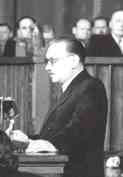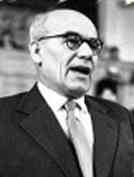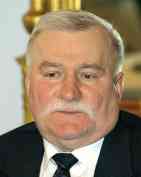Party secretaries
Boleslaw Bierut Wladyslaw Gomolka


| This is Info-Poland's cache of http://www.citinet.net/ak/polska_19_f2.html. It's the snapshot that we took of the page when we last activated our link to it. The page may have changed since that time or the link to it may be broken. |
After six years of German occupation the Poles were prepared to put up
with almost anything. The workers wanted a system which recognized their needs,
the peasants wanted land, the young intelligentsia wanted a fresh start, and
everyone wanted peace and bread. The new regime needed to deliver only a modicum
of these in order to ensure broad-based support. Its failure to deliver anything
but incompetence, venality and repression over the next forty years is puzzling
to anyone not acquainted with the workings of Soviet-style socialism.
While
they had few illusion about the Soviet Union and its methods, people were eager
to rebuild the devastated country, and ready to shed their prejudices and
private interests. At the same time, many never reconciled themselves in any way
to what had happened (West betrayal at the Yalta and Potsdam conferences). The
majority of those stranded in the West at the end of the war chose not to
return, and the wisdom of their choice soon became apparent. The security
services, which received its order direct from Moscow, thrust its tentacles into
every corner and crevices, gradually spreading fear throughout society as it
became clear that there was no such thing as an innocent person. The communist
Party directed also from Moscow, could not maintain its rule without the
security services and its terror. Party was mostly made up of the bureaucrats of
one sort or another, and being a Party member became virtually synonymous with
being a functionary. A vast privileged class sprang up, a nomenklatura on the
Russian model, living a life very different from that of their ordinary
compatriots.
Party secretaries
Boleslaw Bierut Wladyslaw Gomolka


Yet in spite of the fact that this self-perpetuating oligarchy had a huge
army and even larger security services at its disposal, it could not do entirely
as it pleased, for it was dealing with a nation whose most learned intellectuals
and simplest peasants alike worshipped democracy and legality. They also
worshipped God. This was an anomaly in a marxist state, and it baffled and
irritated the communists who believed that indoctrination and persecution would
eventually alter it. Very soon they had to concede that it would not. The Church
came through the war morally enhanced by its uncompromising stand against the
Germans. Thousand of priests had been sent to concentration camps or shot, and
no trace of collaboration tainted the hierarchy. This made it all the more
difficult for the new regime to persecute it. But still the Church lands were
nationalized and its charitable institutions taken over by the state. Religious
instruction was forbidden in schools and chaplains were banned from army,
prisons and hospitals. Many priest were imprisoned and condemned to
death.
The Party was trying to keep both peasants and workers out of
politics. The peasants were forced into collective farms on the Russian model
and remaining private peasant farms were squeezed by the imposition of
compulsory quotas which they had to deliver at fixed prices usually below the
cost of production. The postwar industrialization was also drawing a lot of
people from the countryside into the towns but much of it defied common sense.
New factories were build hundreds of miles away from existing industrial
centers, coalfields or manpower pools. The planners had a weakness for vast
projects, great steelworks that would be seen and smelt for mile around, like so
many monuments to the socialist achievement. The pattern of Poland's
industrialization was also dictated by the Soviet Union, which wanted the
economies of its satellites to complement its own. It was Soviet demands too
that Poland had to maintain a huge army and police apparatus, and to pay the
keep of the Russian armies stationed in Poland. Finally, Poland was bound by
trade treaties which crippled the economy. In the education, the textbooks,
particularly on history, were rewritten and a plethora of new subjects, mostly
dealing with Marxism or Russian communism, found its way on to the curriculum.
Writers, musicians, painters and sculptors had to glorify the Party and the
USSR. When after Stalin death in 1953, the political life was blown open, even
senior Party members were astonished to hear to what extent every aspect of life
had been dictated by Moscow. A lot of people were released from prison and the
security services lowered their profile. Party admitted that 'mistakes' had been
made and in 1956 Nikita Khrushchev made his famous speech to the Congress of the
Communist Party of the Soviet Union denouncing Stalin's rule. In Poland another
70,000 political prisoners were release and some security men were arrested, but
unfortunately this did not herald radical change. The people demonstrated for
more freedom and the authorities responded by sending in tanks and reactionaries
within the Party argued that such outbreaks were the inevitable consequences of
relaxing discipline. The Russian troops stationed in Poland began to march on
Warsaw but finally the Polish government had contain the situation, and the
Soviet units returned to base. The Party declared that it will lead Poland on a
new road to Socialism with a human face and a Polish costume, but the changes
were largely cosmetic. The Poles understood that ether the country was ruled by
the Polish communist party or it would be taken over directly by the Soviet
Union.
Faced with the injustice, falsehood and drabness of socialist reality,
people of all classes sought solace, truth and beauty in the Catholic Faith.
After 1956, the university once more became centers of learning and discussion.
Contact with the outside world meant that those brought up under Stalin were now
able to see that there were options. People began to think aloud once more but
in 1968 the Warsaw university student demonstration, once more, was dispersed
with unwarranted brutality by the police and hundreds of students were arrested.
As wages slumped and working conditions declined, absenteeism and careless work
crippled production. The private sector in agriculture was starved of
investment. The cost of living had risen, while wages lagged far behind and in
1970 the workers in Gdansk went on strike and marched in protest to the local
Party headquarters. The police opened fire on them. Similar confrontations took
place in Gdynia, Elblag and in Szczecin and the tanks moved in. The numbers of
death reached into hundreds.
Party secretaries
|
Edward Gierek |
Wojciech Jaruzelski |
The Party admitted that this was 'a painful reminder that the Party must
never lose touch with the working class and the nation'. But the next ten years
were to transform this lack of contact into an unbridgeable chasm. The plans for
an 'economic leap forward' were financed by massive borrowing from the West
which was to be repaid through the improved extraction of raw materials and the
export of goods produced in new factories built with foreign capital and money
poured in from Western banks only happy to lend. Production rose sharply, and
the Polish economy began to grow rapidly. The standard of living went up, and
its cost went down. It was not long before cracks began to appear. The new
factories products were difficult to sell in the West and the foreign debt
spiraled. The only answer was to increase export of coal and other raw
materials, and to divert consumer goods originally intended for the home market
to export. The consequences were felt immediately, and shortage of staple items
grew more and more frequent. When in 1976, the prices of food were raised, the
strikes broke out all over the country and soon turned to rioting. And once
again the police went into action and hundreds of workers were arrested and
sentenced to prison. The crisis brought to the surface that the economic
progress was based on an assumption of technical competence of the Party cadres,
but the reality was opposite and even more, the corruption came in on the tail
of incompetence. The principle of negative selection that attracted society's
dross into the Party was avenging itself. In the same time Polish capital and
personnel were committed to Soviet development projects; Polish goods produced
from dollar investments were sold on for useless rubles; and the level of
'fraternal aid' to 'liberation movements' in the third world rose sharply. On
the other hand the society had grown more assertive and politically more mature.
Since the war Polish culture has evolved in a great semaphoric concert of
individual scattered throughout the world, but in 1970s the droves of young
Poles provided access to information of every sort. The opportunity to see other
systems in operation gave people brought up under a totalitarian regime a
valuable scale of comparison in terms of the civil and political rights they
might feel due to them. This was a very different society that was confronting
the Party. It was not conditioned to endure and resist silently. It was well
informed and no longer believed a word of communist government propaganda, it
knew that a different sort of life was possible, and it knew that the rest of
Europe was once more aware of its plight. Finally the election of the Pole as a
Pope John Paul II was not only a solace in polish misery, as well as a great
national honor, it was also the final breach in the wall behind which Poles had
been kept since 1945. The hapless Party was foundering in the morass of its
economic 'miracle' and once again made the mistake of balancing the books by
drastic rises in the price of food. A rash of strikes broke out in response, but
this time their tenor and their strategy were entirely new. This was the
beginning of the end of communism era.

Lech Walesa
In 1980 the striking workers of Gdansk Shipyard leaded by Lech Walesa
occupied the shipyard and demanded that representatives of the government come
to listen to a whole list of demands. Enterprises all over the country staged
similar sit-ins, and an Interfactory Strike Committee was formed to coordinate
the movement. The government quickly gauged the strength and determination of
the movement and signed an agreement with the workers. This was a whole package
involving the establishment of free trade unions, the freedom of information,
access to the media and civil rights. It was the first authentic workers
revolution in European history. It was appropriate that the new trade union
should take the name of Solidarity, since it was this very filing between all
segments of the nation that gave it such strength. Soon the various unions
affiliated to Solidarity had over ten million members, which in a population of
just over 35 million, represented virtually everyone of working age. Over the
next fifteen months Polish society took a warm bath in its own values and the
sense of human dignity reentered people's dealing with each other. Every facet
of life was affected by the novel sense of freedom and renewal and people
stopped looking over their shoulders. On the other hand, the harvest of Party
economic policy was a bitter one. The foreign debt reached giddy heights while
the machinery bought with borrowed currency ether fell to pieces or ground to
halt for lack of spare parts. The Party had not only lost control, it had fallen
apart.
The Soviet Union had tolerated what was happening only because it
could not do otherwise. It was diplomatically isolated as a result of its
invasion of Afghanistan, and economically dependent on the West, which for once,
seemed prepared to make more than pious noises. But one thing the Soviet Union
could under no circumstances countenance, however, was any idea of the
dismantling of its apparat in Poland. It was when the apparat's monopoly of
power came into question that the Soviet Union felt compelled to act. In
December 1981 general Wojciech Jaruzeski, a man blindly faithful to Moscow, in a
complex military operation carried out with surprising efficiency, arrested
virtually the entire Solidarity leadership. Thousand of people were dragged from
their beds and ferried through the freezing night to prisons, while tanks
patrolled the snow covered streets. Communications were cut and a 'State of War'
was declared. The workers were unprepared, and there was little resistance.
Although a few Solidarity leaders remained in hiding and mounted a campaign of
underground opposition, the movement was ostensibly crushed. Jaruzelski had
certainly managed to bring Poland back to Moscow's heel with a minimum of
bloodshed. But he was less successful in his attempts at 'normalizing' the
situation. The United States protested in the strongest terms and imposed
stringent trade sanctions. Other Western countries followed suit. This hit
already chaotic economy and Jaruzelski's attempts at reviving it very hard. The
underground leadership of Solidarity insisted that economic progress could only
be achieved in partnership with itself, and regularly appealed to the
authorities to open negotiations, but the General refused. People were harassed
by the police, bullied, beaten up and even murdered. On the other hand most of
those detained, including Walesa, were released in 1983, and a general amnesty
was announced. In the same time, Gorbachov's proposed reforms in the Soviet
Union and pandering to Western opinion robbed Jaruzelski of the certainty that
he could count on Soviet force. Although still outlawed, Solidarity was
reasserting its influence and operated almost openly. Many of the Party
die-hards were keen on a fresh clampdown and on opposite side the volume of
public protest was rising steadily. Finally in 1988 the 'round table' talks
between government and Solidarity were announced and a new government, with a
few independent figures, was formed.
The talks did finally begin in February
1989, and it soon became clear that the talks were really about the elimination
of the Party's influence from every domain of public and private life. The
opposition negotiators however trod warily, allowing generous terms for the
capitulation of the nomenklatura, because nobody could be sure how Gorbachov
would react to fundamental change in Poland, the cornerstone of Soviet military
system. The talks ended in a spirit of harmonious agreement that seemed hard to
believe. Solidarity recovered its legal status, the right of free association
and freedom of speech were guaranteed, as was the independence of the judiciary.
Most important of all, democratic elections to new bicameral parliament were
announced. The party however reserved 65% of the seats in the lower house for
its own members, but the next elections, to be held in 1993, were to be entirely
free.
In 1944 Stalin himself had declared that trying to establish communism
in Poland was like fitting a saddle to a cow. It was a nonsense from the start,
and it was bound to fail. The Poles achieved their ends without provoking
dangerous reactions, and the way they acted throughout was a tribute to the
political maturity of the population as a whole.
Excerpts from the
book "The Polish Way" by Adam Zamojski
(John Murray-Publishers Ltd. London
1987)